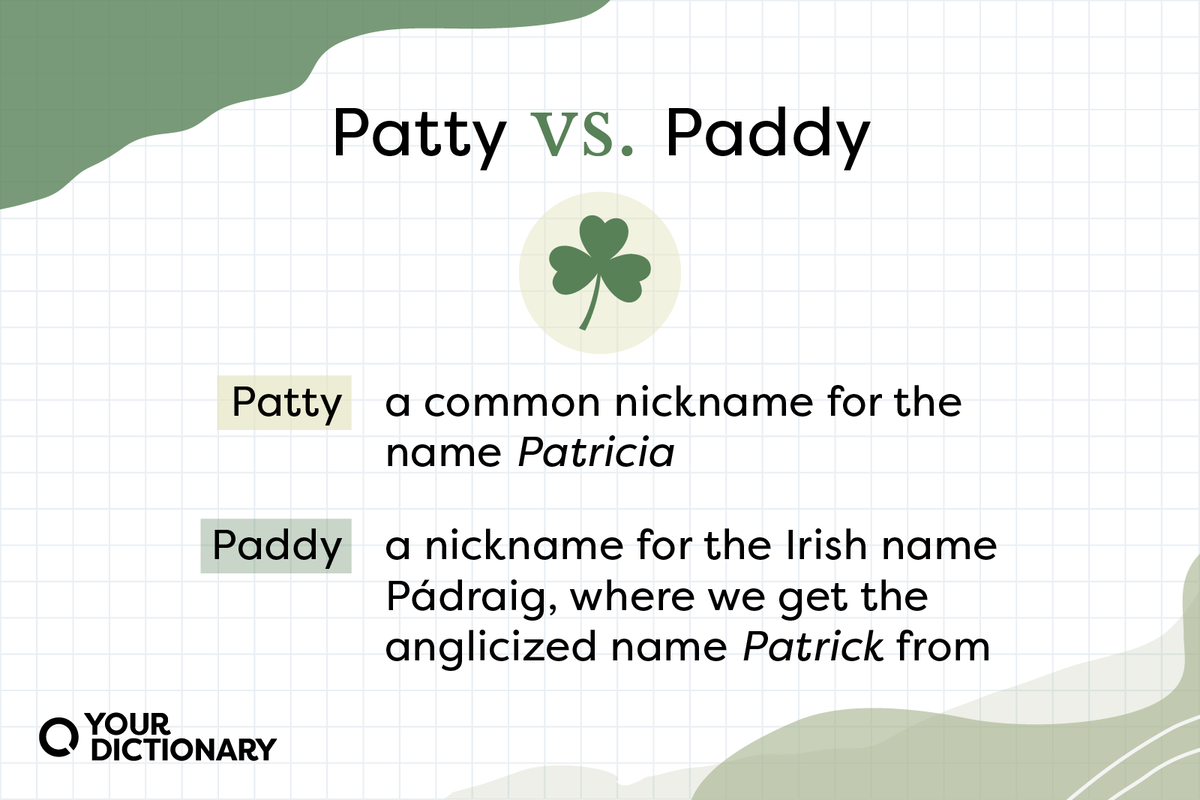
March 17 is St. Patrick’s Day, an annual religious and secular holiday celebrated across the globe by those with Irish heritage.
While Christians still celebrate the holiday as a religious feast, the secular side is undoubtedly known for parades, the color green, and its reputation as an excuse to grab quite a few pints of Guinness. This is why so many people shorten the name of the holiday to St. Paddy’s Day (or is it St. Patty’s)?
The short answer: You should probably stick to St. Paddy unless you want to end up in the green waters of the Chicago River.
How Do You Spell “Paddy”?
To people in Ireland, and those who are deeply in touch with their Irish heritage, this debate is virtually non-existent. Why? Because Paddy is a nickname for the Irish name Pádraig, where we get the anglicized name Patrick from.
Even though Patrick is spelled with a t, many still use the nickname Paddy due to its Irish origin. This is why there is still so much confusion on the spelling of this nickname outside of Ireland.
Patty, on the otherhand, is usually a common nickname for Patricia. Misuse of Patty in St. Patty’s Day didn’t gain traction until the late 1990s, but it’s grown as a misspelling over the years. And, since St. Paddy’s Day is a celebration of all things Irish and is supposed to honor St. Pádraig, not St. Patricia, using St. Patty’s Day might cause a bit of commotion in the pub.
Fast Fact
Americans sometimes shorten St. Patrick’s Day to St. Pat’s Day to avoid any spelling confusion, as Pat is a more common nickname for Patrick than Paddy.
Why Do We Shorten “St. Patrick’s Day” To “St. Paddy’s Day”?
St. Patrick’s Day began as a religious feast to honor St. Patrick, a Christian figure who was said to have brought Christianity to Ireland. There are many folktales about St. Patrick, such as him single-handedly removing all snakes from the grassy nation and even raising people from the dead.
Because of St. Patrick’s status as a folk hero for the Irish people, his feast day in the Christian church became both a celebration of his legacy but also of Irish culture. When Irish immigrants came to the United States they brought their culture with them, and they used St. Patrick’s Day to celebrate that culture.
As early as the 1700s, cities like New York City and Boston held large-scale parades and celebrations for St. Patrick’s Day that elevated the holiday from a holy feast day to a national celebration of all things Irish.
For that reason, St. Patrick’s Day is often seen as a playful, celebratory day by many, and it is treated with less formal, religious reverence than it is within the church.
The shortening to St. Paddy’s Day came to be as a way to make the holiday’s title seem more informal and relaxed to meet this perception of it as a cultural celebration.
Is St. Patrick’s Day Capitalized?
St. Patrick’s Day (and St. Paddy’s Day) is always capitalized because:
- saint is always capitalized when used as a title
- proper names are always capitalized
- religious holidays are always capitalized
Do You Need an Apostrophe in St. Patrick’s Day?
You need the apostrophe in St. Patrick’s Day to show that it is a day dedicated to St. Patrick. Without it, the holiday becomes a day of celebration for multiple saints named Patrick.
Is It Okay To Say “Happy St. Paddy’s Day”?
If you’re celebrating St. Patrick’s Day at a parade, party, pub, or other pleasant place, feel free to wish everyone a “Happy St. Paddy’s Day!”
But, if you’re at a church, or a religious event, you’ll probably want to stick to the formal St. Patrick’s Day.
Here are some other greetings and phrases you might use on March 17:
- St. Patrick’s blessings to you - a religious, revenant greeting for the holiday
- Wetting the shamrock - this means “get a drink”
- There is a tradition to place a shamrock, the sprig traditionally used as a symbol for St. Patrick, into the final drink of the evening on St. Patrick’s Day.
- Erin Go Bragh! - (pronounced Er-In-Go-Brah) an Irish phrase meaning “Ireland Forever!”
There are also some phrases you might want to avoid using at the St. Paddy’s Day parade:
- Happy St. Patty’s Day - if you’re writing it out, you might save this one for St. Patricia’s Day
- Top ‘o the mornin’ to ya - this commonly used “Irish” phrase is based on American stereotypes of Irish culture, so it’s best to avoid it
- Hey, Paddy - wait, wasn’t the rest of this article about how it’s okay to call it St. Paddy’s Day?
- Paddy can be used as an endearing nickname for people named Patrick, like the saint.
- But Paddy was once, and still is in some places, an offensive term to describe a person of Irish heritage as angry, drunk, and wild.